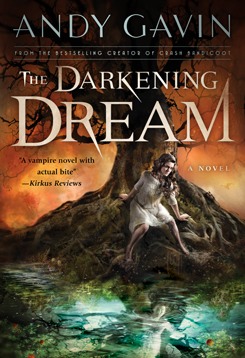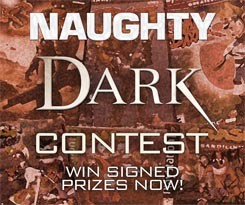 Title: Bleeding Violet
Title: Bleeding Violet
Author: Dia Reeves
Genre: Paranormal YA
Length: 84,000 words, 454 pages
Read: March 14-20, 2011
Summary: Unique, good, and very different.
This is a weird weird book, and I mean that in a good way. Nominally, it’s about a schizophrenic girl, Hanna, who’s dad has died and who decides to move in unannounced with her mom she’s never met. But her mom doesn’t live in a normal town. She lives in some kind of weird place in Texas where gates between universes have let all sorts of strange monsters and realities in. A town with its own supernatural police.
The voice here is really fun. It’s first person past, but with a sort of cavalier devil-take-care crazy-girl style. I liked it. Some sentences were fantastic (both literally and figuratively). Not exactly in the lyrical kind of way that you might expect, but because of their deft wit, and quick and creative way of describing utterly fantastic goings on.
Because this book is FILLED, PACKED, STUFFED, with weird monsters and magic. Reeves uses the protagonist and POV character very deftly to explain it, or mostly just show what happens. She doesn’t feel the need to combine herself to easy concepts either. For example, sound sucking, student grabbing, invisible squids live inside the high school windows and one of the characters defeats them with a deck of playing cards! It’s a tribute to her skill that I could follow nearly all of this stuff. And it’s compact too, not being a very long book and containing dozens of strange encounters. The descriptions are lean but vivid. Occasionally she violates POV slightly on the side of clarity because the protagonist is new to this stuff and she explains it with a bit more understanding than she might be expected to have. But this isn’t very noticeable. Now I do wonder if someone with less experience reading speculative fiction in all its forms might have trouble with this novel. I mean, I’ve read A LOT (5000+ speculative novels), and played hundreds if not thousands of video games with magical systems etc. We won’t even count the movies and TV shows. Certainly someone who likes their reality… well… real, would be put off by the book. I wasn’t. The supernatural flavor was really interesting and unique, reminding me ever so slightly of something like the eerie Lost Room, or the wonderful but very out of print Marianne series by Sherri S Tepper.
The choice of using such a fractured POV character was interesting. There could be an argument that the entire book was some sort of delusion. I myself just treated Hanna’s view point as literal, and everything she saw as factual. The protagonist, and some of the other characters for that matter, don’t feel entirely real. They aren’t cardboard per se, as they feel well rounded, they just have a bit of surreal style to them that comes from their rather depressed moral compass. There’s a lot of killing and murder in this book, often horrifically grisly in fact, and no one seems to care too much. One of your best friends has been impregnated by evil demon spawn who are eating her from the inside out, well, just cut them out and leave her bleeding to die. That sort of thing. It works in the story, but if you stop and thing about the reactions any non psychopathic person might have… These characters just move on. It didn’t really bother me in the context of this story as the narrator’s view point tends to whitewash away the consequences.
There’s also a good bit of cavalier sexuality — a welcome break from the self censorship that seems to be the norm since the 90s. Hanna is certainly open minded in that regard, and likes to take off her clothes. Unfortunately 🙂 there isn’t a lot of detail, like most everything else in the book a lot is left to the imagination. This is also part of the trend. To tell the truth Judy Blume’s Forever (1975) is still the most explicit teen book I can remember.
Overall, this is a great book, but it’s much more FANTASTIC than your typical paranormal. Being a fantasist, that was more than fine with me.



 Title:
Title:  Title:
Title: 






 Title:
Title: 








